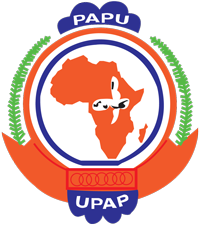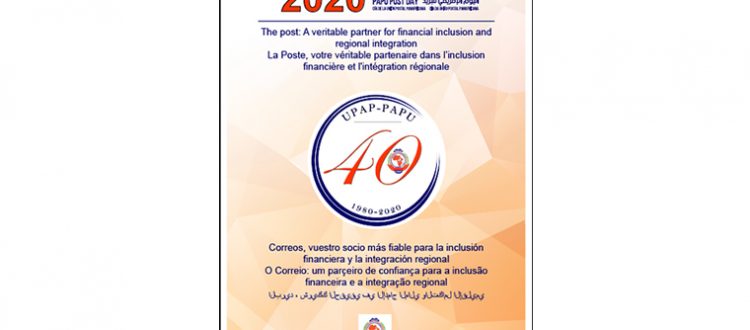PAPU POST DAY 18 JANUARY 2020
MESSAGE FROM THE SECRETARY GENERAL
THEME: “THE POST: A VERITABLE PARTNER FOR FINANCIAL INCLUSION AND REGIONAL INTEGRATION”
With humility and gratitude to the Almighty and Merciful God, we are very blessed and privileged to welcome yet another new year, 2020. May all your plans and dreams in the year that has just passed be transformed into concrete achievements during the New Year.
In line with our warm and brotherly tradition, I would like to take this opportunity to salute the African postal fraternity, and wish you all warm felicitations and resounding success in the New Year.
The theme of this year edition of PAPU Post Day is “The Post: A veritable partner for financial inclusion and regional integration”.
This theme is carrying together two core areas, namely regional integration and financial inclusion. On the one hand, financial inclusion leads us into an examination of the UN SDGs and AU Agenda 2063 which show that social and economic inclusion as well as innovation are the key focus of government’s development agenda. Within these frameworks, Financial Inclusion is important because according to the World Bank Group (2015), it enables individuals and businesses to have access to useful and affordable financial products and services that meet their needs in the form of transactions, such as payments, savings, credit and insurance, delivered in a responsible and sustainable way.
Access to a transaction accounts is a first step towards broader financial inclusion, since it allows people to store money as well as send and receive payments. A transaction account can also serve as a gateway to other financial services, which is why ensuring that people worldwide – and indeed in Africa – can have access to a transaction account is the focus of the World Bank Group’s Universal Financial Access 2020 initiative.
Financial access facilitates day-to-day living, and helps families and businesses plan for long-term goals as well as unexpected emergencies. As account holders, people are more likely to use other financial services, such as credit and insurance, to start and expand businesses, invest in education or health, manage risk, and weather financial shocks, thus giving them the possibility to improve the overall quality of their lives. This entails that the more vulnerable communities are included in the formal banking sector, the more the rate of socio economic development is accelerated.
In pursuit of financial inclusion, Resolution No. L12 on Postal Financial Services was adopted by the joint AU/UNECA Ministers of Finance in 2014 in Abuja, Nigeria, confirming the need for postal networks to use broadband and deploy advanced information and communication technology with a view to providing adequate access to basic financial and other services.
This confirmed its commitment to prioritizing the transformation of existing postal assets and resources, with a view to increasing access to basic services, thereby promoting financial inclusion and, among others, encouraged development partners, in particular the African Development Bank, the Economic Commission for Africa, the Universal Postal Union, the European Union, the International Fund for Agricultural Development, the World Bank, the Bill and Melinda Gates Foundation, the Consultative Group to Assist the Poor and the World Savings Bank Institute, to support the implementation of this Resolution.
Furthermore by “Resolution No. 04/PAPU/AC/XXXVIII/2019 on implementation of Financial Inclusion Projects” passed in June 2019, the Administrative Council of the Pan African Postal Union (PAPU) reiterated that Financial Inclusion was identified as a level two priority by the Istanbul World Postal Strategy (IWPS), adding that it was in line with the United Nations Sustainable Development Goal 6 and Aspiration 1 of the African Union Agenda 2063. Making reference to Resolutions No. 09/PAPU/AC/XXXVI/2017 and 04/PAPU/AC/XXXVII/2018 on implementation of Digitization and Financial Inclusion Projects to ensure improvement of financial services, the Council resolved that Member states should exhaust all possible funding sources to facilitate financial inclusion initiatives. Moreover, the Council urged Member States to implement financial inclusion and digitization projects, by using available solutions to facilitate the provision of efficient and cost effective financial services.
On the other hand, regional integration takes us back into history. Indeed, since 1963, the quest for African Unity has been driven by the spirit of Pan-Africanism, built around liberation, as well as political and economic independence. It is fueled by a desire for development based on self-reliance and self-determination of African people, with democratic and people-centered governance. Furthermore, this entails accelerating progress towards continental unity and integration for sustained growth, trade, exchange of goods and services, free movement of people and capital.
This can be achieved through establishing a United Africa and fast-tracking economic integration, improving connectivity through newer and bolder initiatives to link the continent by rail, road, sea and air; and developing regional and continental power pools, as well as ICT. In doing so, all remnants of colonialism will have ended and all African territories under occupation fully liberated.
That quest is succinctly anchored by Aspiration 2 of the African Union’s Agenda 2063: “The Africa we want”, which is aimed at achieving: “An integrated continent politically united and based on the ideals of Pan-Africanism and the vision of Africa’s Renaissance.”
In view of the foregoing, we enjoin our Members this year to also mark the 40th Anniversary of our organization by making their staff to understand the potential role of the post in bolstering regional integration and financial inclusion in Africa. Thus, the goals of this theme are as follows:
- Establish the link between the post and its contribution towards socioeconomic development on the continent via financial inclusion initiatives.
- Understand role of the post in the pursuit of political and economic integration which includes free movement of persons and goods/services as well as establishment of Continental Free Trade Areas, among others. Strategies to achieve these activities may include introduction of measures to boost e-commerce and electronic transfers for trade promotion, etc.
As we celebrate the Pan African Post Day on 18th January, 2020, I urge each and every one of us to show more commitment to the sector’s development mandate and objectives and recognize the vital role it plays as a key infrastructure in social and economic development.
In this perspective, I once again wish you and your loved ones a peaceful, healthy, highly successful, happy and prosperous year 2020!
Long live African postal community!
Long live Africa!
Long live African postal sector!
YOUNOUSS Djibrine
SECRETARY GENERAL
 English
English French
French
